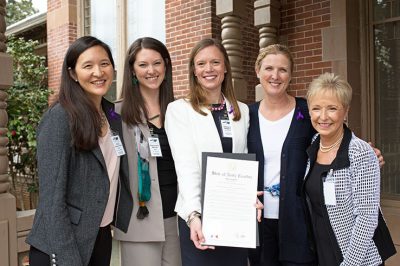Wheeler visits executive mansion to mark NC’s inaugural Metastatic Breast Cancer Awareness Month
April 12, 2017
Stephanie Wheeler, PhD, associate professor of health policy and management at UNC’s Gillings School of Global Public Health, was among those invited to speak at the Governor’s Mansion in Raleigh, N.C., during an April 3 event that focused attention upon metastatic breast cancer as the second-leading cause of cancer death among women.
North Carolina Governor Roy Cooper recently declared April to be Metastatic Breast Cancer Awareness Month in the state, and at the event, First Lady Kristin Cooper read the governor’s proclamation.
“We’re shining a light on metastatic breast cancer to raise awareness for those living with the disease – and to encourage continued advances in research and treatment,” Mrs. Cooper said in a statement.
Metastatic breast cancer, which is incurable but treatable, occurs when cancer has spread beyond the breast to other organs. Wheeler noted that up to 30 percent of North Carolinians diagnosed with breast cancer will develop metastatic breast cancer, even as much as 20 years after remission. Due to effective therapies, people with metastatic breast cancer can live for many years, but survival rates vary by income, race and geography.

Left to right are Dr. Eliza Park, Dr. Stephanie Wheeler, Dr. Carey Anders, Dr. Lisa Carey and Jean Sellers, who attended a luncheon hosted by N.C. First Lady Kristin Cooper to raise awareness about metastatic breast cancer.
“We are currently doing work at UNC to understand how to mitigate these issues,” Wheeler said. “Specifically, we are exploring how patients and their caregivers manage the out-of-pocket cost burden of their disease and how they navigate the finances of cancer care, with the intention of creating processes to better monitor financial toxicity and triage women for financial assistance and support.”
Wheeler, a member of the UNC Lineberger Comprehensive Cancer Center, participated in panel discussions during the event, as did other UNC Lineberger researchers and physicians, a woman with metastatic breast cancer, and a representative of the American Cancer Society Cancer Action Network.
Jean Sellers, RN, MSN, administrative clinical director at the UNC Lineberger and president of the North Carolina Oncology Navigator Association, which hosted the event, said raising awareness about the disease will lead to greater support.
“Our goal is to expand the conversation about metastatic breast cancer,” she said in a statement. “North Carolinians with this disease are facing treatment for the rest of their lives, all while potentially still working, caring for their families and engaging with their communities. While I am hopeful that we will one day have a cure, we want to empower our patients and create an environment in which they and their families feel supported.”
A version of this article originally appeared on the UNC Lineberger website.
Gillings School of Global Public Health contact: David Pesci, director of communications, (919) 962-2600 or dpesci@unc.edu

